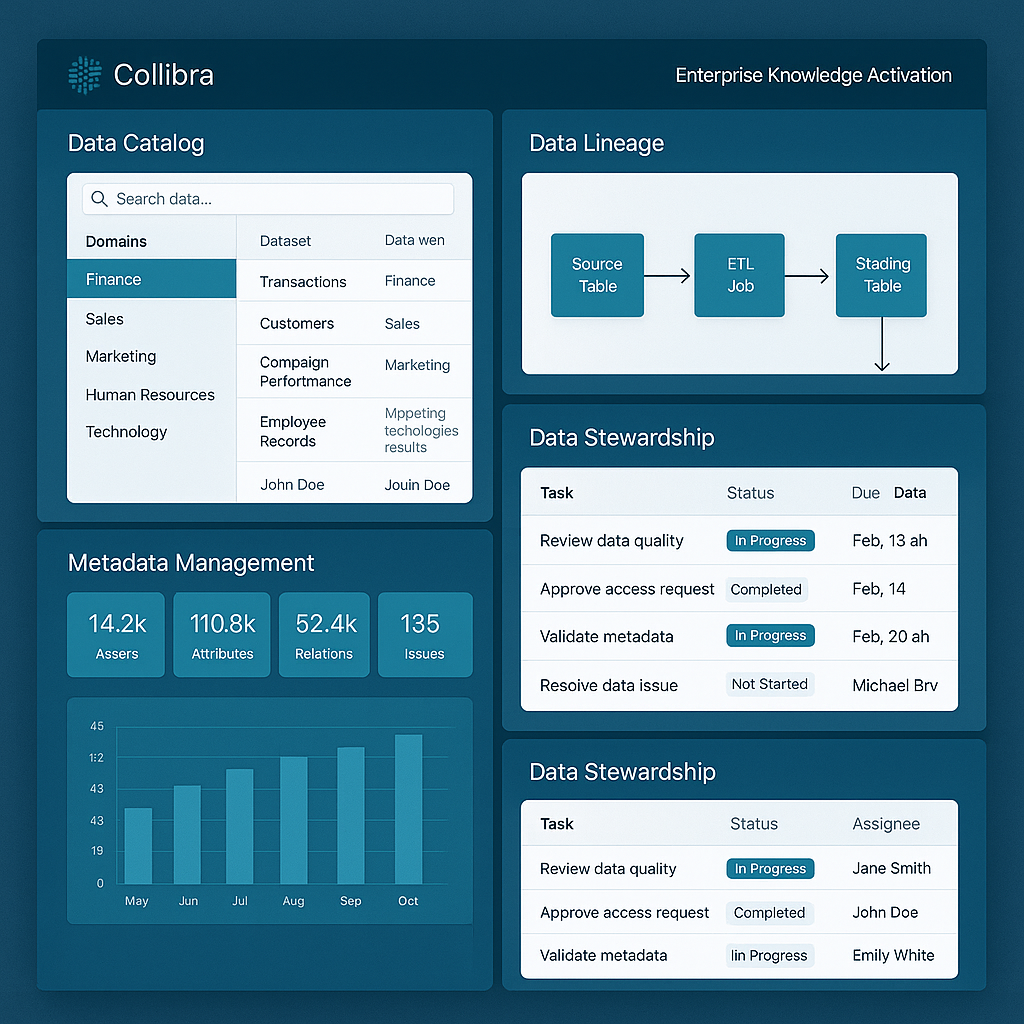
Table of Contents
Throughout this series, we’ve explored a multitude of enterprise systems that generate, process, and store vast quantities of data (from ERPs like NetSuite to CRMs like Salesforce). However, a critical question remains: how do organizations ensure this data is discoverable, trustworthy, and used in a compliant manner?
This is the domain of data governance, and while the concept is not new, the platforms enabling it have become increasingly sophisticated. Collibra has positioned itself as a leader in this space, not as a data storage system, but as a Data Intelligence Platform, a system of engagement for enterprise data.
Collibra as a Data Intelligence Platform
What does it mean to be a “system of engagement” for data? A perspective forged through years of navigating real-world enterprise integrations suggests that the biggest challenge in data management isn’t technical; it’s organizational and collaborative.
Data assets are often hidden in silos, their definitions are inconsistent, and their lineage is unclear. Collibra tackles this by providing a centralized platform where data citizens (from business analysts to data scientists) can find, understand, and collaborate on data.
It doesn’t hold the data itself; it holds the metadata, the context that gives data its meaning.
The Data Catalog: Foundation of Data Discovery
The core of the Collibra platform is its Data Catalog. This is far more than a simple inventory of data assets. The catalog automatically harvests technical metadata from source systems across the enterprise. It stitches it together with business context provided by human experts.
This creates a rich, searchable repository where a user can not only find a data set but also understand its business definition, who owns it, its quality score, and how it’s being used across the organization. This process of discovery and understanding is the first step toward building a data-driven culture.
Operationalizing Data Governance and Lineage
Building upon this catalog, Collibra provides a robust framework for data governance and stewardship. Insights distilled from numerous complex system deployments indicate that governance policies are useless if they live in a binder on a shelf.
Collibra allows organizations to operationalize their governance policies through automated workflows. For example, workflows can be created for data quality issue resolution, access requests, and the certification of critical data elements.
This ensures that governance is not an afterthought, but an active, integrated part of the data lifecycle. It assigns clear ownership and accountability, which is essential for maintaining data integrity.
Furthermore, Collibra’s focus on data lineage provides a clear, visual map of how data flows and transforms from its source to its consumption in reports and analytics. This is critical for a number of reasons.
For compliance, it provides the audit trail needed to satisfy regulators. For impact analysis, it allows teams to understand which downstream reports will be affected if a change is made to an upstream data source.
For trust, it gives analysts the confidence that they are using the right data for their analysis. As I’ve noted before, robust data governance is a foundational element for a modern enterprise (Financial Data Governance: Building Sustainable Frameworks for Modern Complexity), and Collibra provides the tooling to make it a reality.
Implementation Challenges and Success Factors
Collibra is not a plug-and-play solution. Its implementation requires a significant commitment to defining roles, responsibilities, and processes. (The technology is an enabler of cultural change, not a substitute for it).
Key success factors include securing executive sponsorship for data governance initiatives, establishing clear ownership models with defined data stewards, and investing in change management to drive user adoption across diverse business units.
Common pitfalls involve treating Collibra as a purely technical implementation rather than an organizational transformation, underestimating the effort required for metadata harvesting and business context development, and failing to establish sustainable governance processes that outlive initial implementation momentum.
ROI realization typically comes through improved decision-making speed, reduced regulatory compliance costs, decreased data preparation time for analytics projects, and enhanced confidence in data-driven insights across the organization.
However, for large, complex organizations struggling to get value from their data, it provides the essential framework for turning data from a liability into a strategic asset. It activates the knowledge that is locked away inside other enterprise systems, making it discoverable, understandable, and trustworthy.
This concludes our five-part series on key enterprise systems. I welcome your thoughts and connections on LinkedIn.